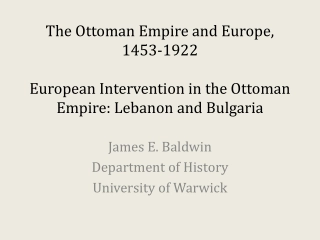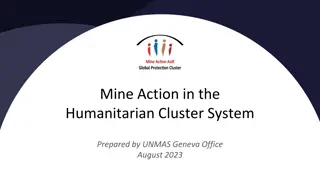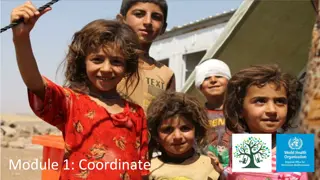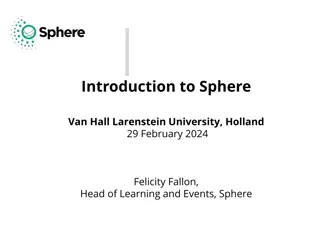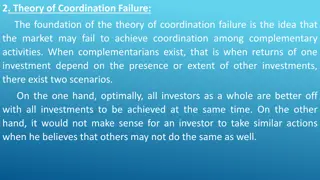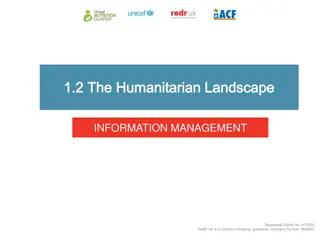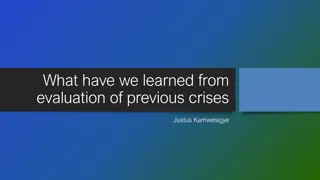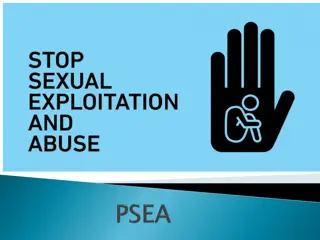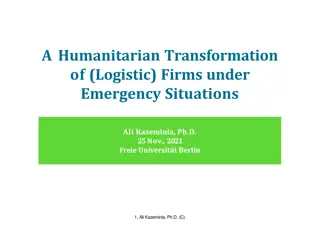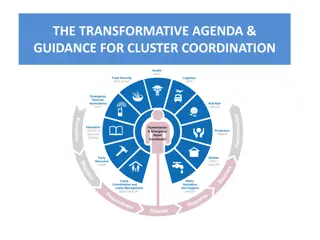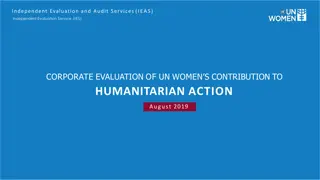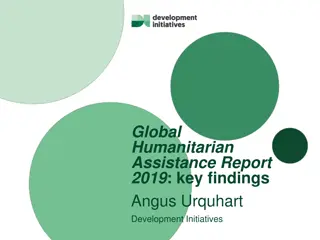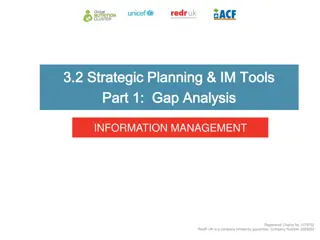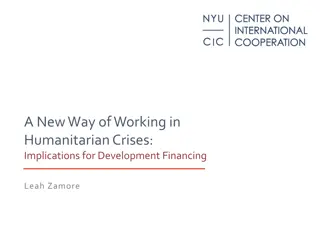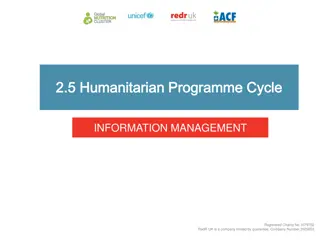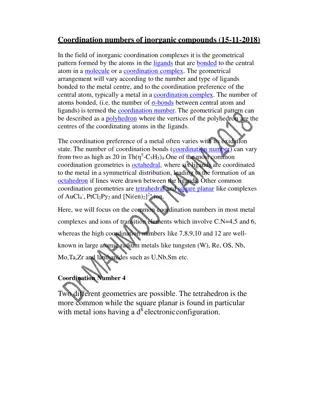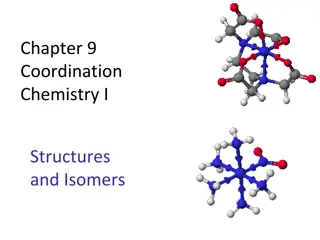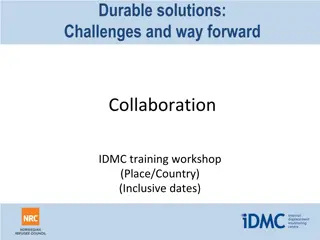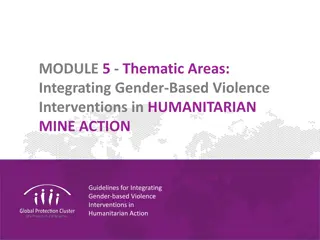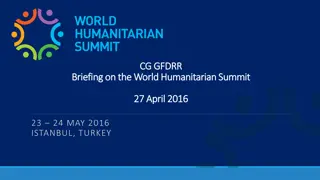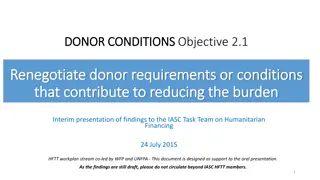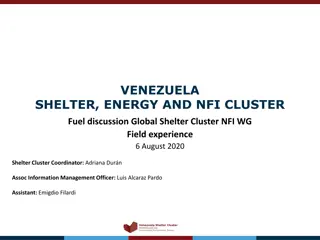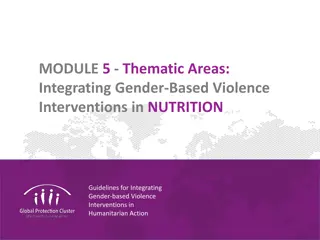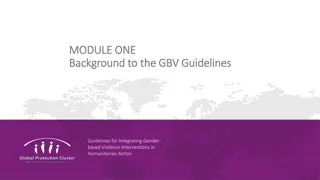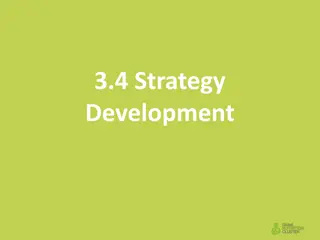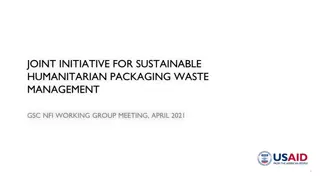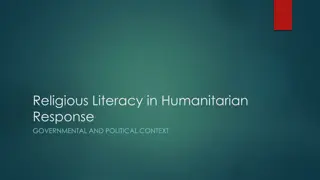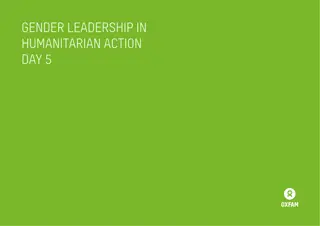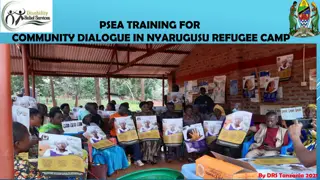European Humanitarian Intervention in the Ottoman Empire
Explore European powers' moral duty to intervene in Ottoman affairs during the 19th century, motivated by humanitarian and imperial interests. Discover the impact of the Concert of Europe and legal theories on humanitarian intervention.
3 views • 22 slides
Food Security Cluster Coordination Meeting - Middle Shabelle Region
A coordination meeting held in Middle Shabelle Region focused on food security projects, partner updates, flood situations, and Islamic Relief Somalia's project presentation. The meeting reviewed action points, discussed current challenges, and emphasized collaboration among partners and organizatio
1 views • 26 slides
Mine Action in the Humanitarian Cluster System
The Inter-Agency Standing Committee (IASC) plays a crucial role in coordinating humanitarian efforts, with a focus on mine action in the global protection cluster. This involves clear responsibilities, strategic planning, and advocacy to address humanitarian needs. The IASC Reference Module for Clus
3 views • 18 slides
Comprehensive Guide to Assessing and Prioritizing Child and Adolescent Health in Humanitarian Settings
This module provides a detailed operational guide on assessing and prioritizing child and adolescent health in humanitarian settings. It covers obtaining data on child/adolescent health, coordinating responses, planning activities, and utilizing data systems for monitoring and evaluation. Key compon
7 views • 31 slides
Humanitarian Action and Coordination: Essential Guidelines and Standards
This comprehensive guide provides insights on coordinating child and adolescent health in humanitarian settings, emphasizing the importance of understanding and implementing key actions. It covers the utilization of resources like the operational guide, self-assessment tracker, and core humanitarian
2 views • 43 slides
Understanding Sphere: Humanitarian Standards and Practices
Learn about Sphere, a global movement focusing on humanitarian standards and quality assistance. Explore the Sphere Handbook, its philosophy, and the importance of humanitarian standards. Discover the key areas covered in the Handbook and why they are essential for effective crisis response. Join a
11 views • 31 slides
Gender-Responsive Humanitarian Leadership and Transformation
Challenges in implementing gender-responsive humanitarian programmes require greater political will, leadership, resources, accountability, and capacity building. Feminist leadership aims to transform power dynamics, fight inequality, and create inclusive structures. It involves principles, values,
6 views • 14 slides
Understanding the Theory of Coordination Failure in Markets
The theory of coordination failure explores how markets may struggle to achieve coordination among complementary activities, leading to suboptimal outcomes. It highlights scenarios where investors' actions depend on each other, emphasizing the role of government intervention to solve coordination is
2 views • 14 slides
Understanding Humanitarian Landscape and Coordination Challenges
The humanitarian landscape involves various organizations working together to provide assistance during crises. Coordination challenges, such as identifying needs, existing assistance, and government involvement, have been prevalent. The Inter-Agency Standing Committee (IASC) was established in 1991
1 views • 21 slides
Insights from Evaluation of Previous Humanitarian Crises and Core Humanitarian Standards
Evaluation of past crises reveals the importance of core humanitarian standards in providing timely, coordinated, and effective assistance. Learning from experience, feedback mechanisms, and competent staff are key for addressing humanitarian crises. Data and systems play a crucial role in monitorin
0 views • 13 slides
Inter-Cluster Coordination and Information Management in Humanitarian Emergencies
Inter-Cluster Coordination and Information Management play vital roles in humanitarian emergencies. The coordination mechanism involves regular meetings convened by the RC/HC and coordinated by OCHA, providing opportunities for clusters to collaborate on shared planning, needs assessments, and poole
3 views • 13 slides
Understanding PSEA: Prevention and Response to Sexual Exploitation and Abuse in Humanitarian Settings
Sexual exploitation and abuse in humanitarian settings pose serious threats to vulnerable populations, directly contradicting humanitarian principles. The establishment of initiatives like the Iraq PSEA Network aims to prevent and respond to such misconduct through awareness-raising, capacity buildi
0 views • 14 slides
Humanitarian Transformation of Logistic Firms in Emergency Situations
This research explores how logistic firms evolve into humanitarian entities in response to grand challenges like natural disasters and refugee crises. Case studies and data collection methodologies are utilized to understand the transformation process, as seen in examples such as SOS Mediterrane and
0 views • 8 slides
Transformative Agenda and Guidance for Effective Cluster Coordination
Explore the transformative agenda and guidance for cluster coordination, emphasizing the roles of UNICEF as a cluster lead agency, core cluster functions, inter-cluster coordination, and management strategies for effective humanitarian response. Key focus areas include accountability, human financin
1 views • 19 slides
Corporate Evaluation of UN Women's Contribution to Humanitarian Action
The Independent Evaluation and Audit Services conducted an evaluation of UN Women's work in humanitarian action from 2014-2018, assessing its relevance, effectiveness, and sustainability. The evaluation emphasized the need for stronger links between UN Women's global normative work and humanitarian
0 views • 9 slides
Global Humanitarian Assistance Report 2019 Key Findings
The Global Humanitarian Assistance Report 2019 explores key findings regarding international humanitarian assistance, multi-year funding growth, funding to UN agencies, cash and voucher programs, and direct funding to local and national actors. The report highlights the challenges and disparities in
4 views • 11 slides
Humanitarian Response Planning and Implementation Tools
This content discusses various tools and guidelines used in the strategic planning and implementation stages of humanitarian response operations. It covers gap analysis, flash appeals, gender considerations, humanitarian response plans, secondary data analysis, and GNC IM tools for informing strateg
1 views • 18 slides
Innovative Approaches in Humanitarian Crises and Development Financing
This study explores the New Way of Working in humanitarian crises, focusing on reinforcing national systems, anticipating crises, and transcending humanitarian-development divides. Promising trends include rising government ownership and increased linkages between humanitarian activities and governm
0 views • 6 slides
Understanding the Humanitarian Programme Cycle (HPC)
The Humanitarian Programme Cycle (HPC) is a coordinated series of actions aimed at preparing for, managing, and delivering humanitarian responses efficiently. It focuses on delivering fast, coordinated, effective, and protection-driven aid to those affected by crises. Central to the HPC is the invol
2 views • 8 slides
Promoting Gender Equality in Humanitarian Action
Understand the importance of promoting gender equality in humanitarian action, including principles, challenges, and the need to transform attitudes and beliefs. Learn key global standards, gender analysis, and leadership in humanitarian settings. Explore the rights of women and girls, gender inequa
1 views • 15 slides
Coordination Numbers in Inorganic Compounds: Geometries and Structures
In inorganic coordination complexes, the coordination number refers to the number of atoms bonded to the central atom. Common geometries include octahedral, tetrahedral, and square planar, depending on the type and number of ligands. Transition metal complexes exhibit different coordination numbers
2 views • 8 slides
Understanding Coordination Chemistry: Structures, Isomers, and Naming
Exploring coordination chemistry involves understanding structures, isomers, naming conventions, and common coordination numbers, all essential in studying coordination compounds. Coordination compounds consist of central metals, ligands, and charge balancing ions. Naming involves listing cations, l
0 views • 46 slides
Collaboration for Durable Solutions in Humanitarian Settings
This workshop addresses challenges and opportunities in achieving durable solutions for refugees and internally displaced persons. It emphasizes the importance of collaboration among various stakeholders, including humanitarian and development actors, to ensure long-term recovery and sustainable pea
0 views • 21 slides
Guidelines for Integrating Gender-Based Violence Interventions in Humanitarian Action
This module focuses on integrating gender-based violence interventions into humanitarian mine action, providing guidelines, agenda, outcomes, and strategies for implementation. It emphasizes informing and supporting humanitarian actors to develop action plans and accountability measures to address g
0 views • 56 slides
Insights from the World Humanitarian Summit Briefing
The World Humanitarian Summit, held in Istanbul, Turkey, saw significant participation and contributions. Key topics included consultations, core responsibilities, roundtable discussions, and commitments to address global challenges such as forced displacement, gender equality, and climate change. T
0 views • 15 slides
Renegotiation of Donor Conditions for Humanitarian Financing
This interim presentation outlines the objective of renegotiating donor requirements to reduce burden in humanitarian financing. Findings focus on the severity of conditions, methodology used, respondents involved, general findings, and top conditions affecting humanitarian principles. The document
0 views • 12 slides
Humanitarian Efforts in Addressing Shelter, Energy, and NFI Needs in Venezuela
Humanitarian organizations in Venezuela are working to address the critical needs for shelter, energy, and non-food items in the country. Initiatives such as alternative energy sources for cooking have been implemented to improve access to electricity and essential supplies. Challenges including lim
0 views • 13 slides
Understanding Coordination Complexes and Transition Metals
Today's lecture covers transition elements, coordination complexes, ligand types, geometries, naming, isomers, and bonding in coordination complexes. Transition metals form coordination complexes with metal ions, ligands, and counter ions. The types of ligands include monodentate and bidentate ligan
0 views • 24 slides
The Manfred Lachs International Conference on Conflicts in Space and the Rule of Law
The 4th Manfred Lachs International Conference held in Montreal in 2016 explored the intersection of conflicts in space and the rule of law, specifically focusing on the legal framework surrounding outer space weaponry. Discussions highlighted the importance of upholding humanitarian values, promoti
0 views • 7 slides
IEEE Global Humanitarian Technology Conference (GHTC) 2023
Explore the latest in humanitarian technology at the IEEE Global Humanitarian Technology Conference (GHTC) 2023. Join experts in discussing data-centric operations design for biomedical screening technologies and promoting healthcare delivery. This event aims to leverage technology for the benefit o
0 views • 7 slides
Integrating Gender-Based Violence Interventions in Humanitarian Nutrition Programs
This module focuses on integrating gender-based violence interventions in humanitarian nutrition guidelines. It covers key areas such as linking GBV and humanitarian programming, implementing guidance, assessment, resource mobilization, and developing action plans. The aim is to inform nutrition act
0 views • 56 slides
Enhancing Gender-based Violence Interventions in Humanitarian Action
The guidelines focus on integrating gender-based violence interventions into humanitarian action, emphasizing key changes and additions such as structural modifications, contextual considerations, and enhanced accountability. Led by UNICEF and UNFPA, the revision process involved extensive consultat
0 views • 21 slides
Understanding Humanitarian Response Plans and Flash Appeals
This content explores the features and functions of Flash Appeals and Humanitarian Response Plans (HRP) in crisis management. It delves into the role of clusters in developing these plans, the processes involved in responding to sudden or protracted crises, and the significance of coordination and s
1 views • 17 slides
Joint Initiative for Sustainable Humanitarian Packaging Waste Management Meeting Summary
Collaborative effort of 16 partners in the Joint Initiative for Sustainable Humanitarian Packaging Waste Management, highlighting key steps taken from 2019 to April 2021. The initiative aims to achieve sustainable changes, coordinate efforts, reduce packaging waste, and engage in technical stakehold
0 views • 12 slides
Challenges of Religious Literacy in Humanitarian Response within Governmental and Political Context
Challenges arise in humanitarian response within governmental and political contexts due to secular approaches in religious societies. Issues include discriminatory practices against local faith-based organizations (FBOs), unhelpful gender dynamics, harmful social practices, and simplistic charity m
0 views • 6 slides
Gender Equality Practices in Humanitarian Aid Organizations
Internal organizational practices play a crucial role in ensuring gender equality in organizations delivering humanitarian aid. This includes resource allocation, policies, accountability, and staff training. Oxfam's Minimum Standards outline key practices for promoting gender equality. Accountabili
0 views • 10 slides
James Nachtwey: A Pioneer in Humanitarian Photography
James Nachtwey, a renowned photographer, started his career capturing civil unrest in Northern Ireland. His impactful work with NGOs like the International Committee of the Red Cross has led to significant humanitarian efforts, saving millions of lives. Despite debates on exploitation, Nachtwey's im
0 views • 9 slides
Submarine Cable Resiliency Update and Recommendations
Working Group 4A provides updates on the status of submarine cable resiliency, highlighting the risks to infrastructure due to lack of coordination across agencies and clustering of cable routes. The group aims to enhance regulatory coordination and promote geographic diversity to ensure network res
0 views • 7 slides
Preventing Sexual Exploitation and Abuse in Humanitarian Settings
Understanding Sexual Exploitation and Abuse (SEA) is crucial in humanitarian work. SEA includes acts like sexual exploitation and abuse, and it is strictly prohibited. This training focuses on the history, core principles, and application of SEA within humanitarian organizations to protect beneficia
0 views • 20 slides
Humanitarian Crisis in Palestine: A Special Rapporteur's Analysis
The Special Rapporteur's reports shed light on the ongoing conflict and humanitarian crisis in Palestine. With access denied and protection lacking, the Palestinian people face challenges, as highlighted by incidents such as Operation Protective Edge. The disconnect between rights under Internationa
0 views • 11 slides
